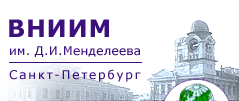The D.I. Mendeleev All-Russian Institute for Metrology (VNIIM) news
Issues related to support of the measurement quality discussed at the D.I. Mendeleyev Institute for Metrology (VNIIM)
Participants of the International Scientific and Technical Seminars: “GUM New Perspective” and “Mathematics, Statistics And Computation To Support Measurement Quality” discussed the issues of developing the concept of measurement uncertainty. The D.I. Mendeleyev Institute of Metrology (VNIIM) organized and hosted these events from 28 to 31 May. 2018. Over seventy Russian and foreign experts in mathematical analysis, data processing, theoretical, legal and applied metrology discussed a new version of the fundamental international document “Guide to the Expression of Uncertainty in Measurement” (GUM) and modern methods for evaluating the measurement accuracy. The members of Working Group 1 of the Joint Committee for Guides in Metrology (WG1 JCGM), Maurice Cox from the National Physical Laboratory (NPL, UK), and Nicolas Fischer from the National Laboratory of Metrology and Testing (LNE, France) made exhaustive reports on the matter at the Seminar “GUM New Perspective”. This Working Group is directly engaged in improving the GUM and, as Maurice Cox pointed out: “The developers of the new document seek to promote its universality, i.e. ability to cover as many areas of activities and fields of measurement as possible. The developing team expects that the document will be used by organizations working in a large variety of domains: from accredited laboratories to scientific research centers, such as VNIIM.” The opportunity to have direct discussions with representatives of the Working Group engaged in improving the GUM was highly appreciated by specialists in applied metrology. One of them, A. Danilov, Director of the Standardization and Metrology Center of the city of Penza, said that “it is very important thing that the legitimacy of both GUM versions (existing and the new one) has been announced from the esteemed podium. The Standardization and Metrology Centers must realize that these changes will inevitably come to Russia and our task now is to ensure a correct transition without creating technical barriers in the export activities of our enterprises”. The program of the Seminar “Mathematics, Statistics And Computation To Support Measurement Quality” consisted of five thematic sections: models, hypothesis testing, calculations of measurement uncertainties, interval analysis, evaluation of measurement uncertainties in calibrations and comparisons, reference materials and analytical measurements, metrology in medicine. Anna Chunovkina, one of the organizers of the Seminar and the Head of the Theoretical Metrology Laboratory, expressed her opinion that “it was a good idea to include a hugely varied range of topics in the Seminar program – from purely mathematical, such as “Interval analysis”, to strictly practical and new ones, such as “Metrology in Medecine”, which aroused lively interest of the audience. It is possible that in future, when forming the program of the next Seminar, we will stick to this approach and will also include issues related to digital analysis of images and processing of large volumes of data”. Many participants noted that similar meetings provide efficient informative and discussion opportunities for all people dealing with measurement data processing and analysis of measurements in a large variety of fields. Articles prepared from the presentations delivered at the Seminars are planned to be published after peer-review in the journal “Izmeritelnaya Technika” (“Measurement Techniques”) by the end of the current year or in the beginning of 2019.




